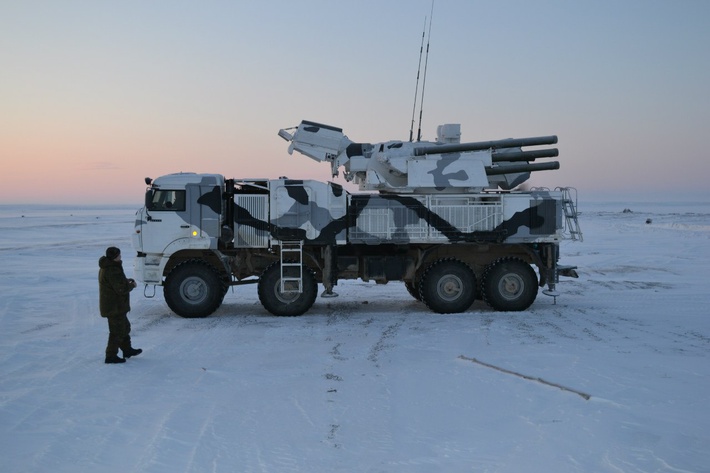How to install the app on iOS
Follow along with the video below to see how to install our site as a web app on your home screen.
Note: This feature may not be available in some browsers.
You are using an out of date browser. It may not display this or other websites correctly.
You should upgrade or use an alternative browser.
You should upgrade or use an alternative browser.
Russian Air Defence Systems. Photos & Videos & Discussion
- Thread starter Barmaley
- Start date
Barmaley
FULL MEMBER

- Joined
- Oct 9, 2014
- Messages
- 1,034
- Reaction score
- 6
- Country
- Location
Awesome, i heard the Pantsir S1 was to replace the Tunguska but thanks for the new info bro
No,
Patsir - is an Object-Oriented Air Defense.
Tunguska - is an air defence of ground forces.
Sir can you post some naval versions of the AD too..
Most of Naval systems has its ground equivalent and vice versa. For example, as far i know, "Shtil" was developed from the "Buk" and "S-350" from the "Redut" and so on.

@Barmaley may i post Radar systems bro?
Sure.
Barmaley
FULL MEMBER

- Joined
- Oct 9, 2014
- Messages
- 1,034
- Reaction score
- 6
- Country
- Location
Kasta 2E Radar
View attachment 284220
2E - it's for export.
There is additional mobile over horizon radar complexes for air defence such as "NEBO-M".
Their range is over 1800km and they are integrated in air defence network.






since 31sec
PARIKRAMA
SENIOR MEMBER

- Joined
- Jan 5, 2014
- Messages
- 4,871
- Reaction score
- 185
- Country
- Location
2E - it's for export.
There is additional mobile over horizon radar complexes for air defence such as "NEBO-M".
Their range is over 1800km and they are integrated in air defence network.






since 31sec
NEBO radars are really awesome..VHF AESA RLM M , UHF L Bank RLF D and S/X band RLM S/X band literally can help detect LO/VLO objects and are the real threat to stealth jets.
Awesome stuff really..
According to Russian military industry, a new missile with a longer range specifically developed for Russia’s S-400 air defense system will push the range at which the system can engage targets to its limit.

Evading Enemies: Russia's S-400 to Be Equipped With High-Tech Communication System
MOSCOW (Sputnik) – A new missile with a longer range specifically developed for Russia’s S-400 air defense system will push the range at which the system can engage targets to its limit, a Russian military industry source said Sunday.
"Missile tests are about to be complete. This missile will allow to use the [S-400] system to its full potential," the source told RIA Novosti, adding the air defense system will be able to engage targets at its maximal range.
The missile is now undergoing the final tests, which are expected to conclude in the near future, according to the Russian Defense Ministry.
The S-400 Triumf (NATO reporting name SA-21 Growler) was added to the Russian Army’s arsenal in 2007. The next-generation system can carry three different types of missiles capable of destroying aerial targets at short-to-extremely long range. It can engage up to 36 targets at once, firing 72 missiles toward them.
Read more: New Missile to Boost S-400 Air Defense System Capability

Evading Enemies: Russia's S-400 to Be Equipped With High-Tech Communication System
MOSCOW (Sputnik) – A new missile with a longer range specifically developed for Russia’s S-400 air defense system will push the range at which the system can engage targets to its limit, a Russian military industry source said Sunday.
"Missile tests are about to be complete. This missile will allow to use the [S-400] system to its full potential," the source told RIA Novosti, adding the air defense system will be able to engage targets at its maximal range.
The missile is now undergoing the final tests, which are expected to conclude in the near future, according to the Russian Defense Ministry.
The S-400 Triumf (NATO reporting name SA-21 Growler) was added to the Russian Army’s arsenal in 2007. The next-generation system can carry three different types of missiles capable of destroying aerial targets at short-to-extremely long range. It can engage up to 36 targets at once, firing 72 missiles toward them.
Read more: New Missile to Boost S-400 Air Defense System Capability
vostok
PDF THINK TANK: ANALYST

- Joined
- Jun 23, 2013
- Messages
- 10,291
- Reaction score
- 27
- Country
- Location
Russian Aerospace Forces get another S-400 missile regiment for Moscow defence - ministry
Another two S-400 regimental sets were in 2015 transferred to the military districts’ antiaircraft defence formations, the Defence Ministry said.
![1119799[1].jpg 1119799[1].jpg](https://defence.pk/attachments/1119799-1-jpg.284851/)
MOSCOW, January 4. /TASS/. Russia’s Aerospace Forces have received another regimental set of the S-400 Triumph air defence missile system that will cover Moscow and the Central Industrial District, the Russian Defence Ministry press service told reporters on Monday. "A new regimental set of the S-400 Triumph air defence missile system has arrived by train at the place of permanent deployment in the Moscow region from the Kapustin Yar range in the Astrakhan region where system’s live fire exercise was held," the ministry said. "With the new system’s putting on combat duty the Aerospace Defence Forces’ antiaircraft defence formation will have four air defence missile regiments equipped with the state-of-the-art S-400 Triumph missile systems ensuring air defence of Moscow and the Central Industrial District," the press service said. Another two S-400 regimental sets were in 2015 transferred to the military districts’ antiaircraft defence formations, the Defence Ministry said. According to early December reports, the number of regiments equipped with the S-400 systems increased by 11 by late 2015. Five more sets of the air defence missile system are expected to be delivered in 2016, thus bringing the number of Russian army’s regiments with the Triumph system up to 16. The S-400 Triumph (NATO reporting name: SA-21 Growler) was developed as an upgrade of the S-300 series of surface-to-air missile systems. The system entered service in April 2007 and the first S-400 was deployed in combat in August 2007. Russia set up four S-400 regiments defending national airspace in the Moscow region, the Baltic exclave of Kaliningrad, and the Eastern Military District. The S-400, manufactured by Almaz-Antey, is capable of targeting up to 36 airplanes at a range of 150 kilometres. The S-400 has the ability to not only shoot down airplanes, but also ballistic missiles. The system is designed to destroy all modern and advanced aerospace targets at a distance of up to 400 kilometers (248.5 miles).
TASS: Military & Defense - Russian Aerospace Forces get another S-400 missile regiment for Moscow defence - ministry
Another two S-400 regimental sets were in 2015 transferred to the military districts’ antiaircraft defence formations, the Defence Ministry said.
MOSCOW, January 4. /TASS/. Russia’s Aerospace Forces have received another regimental set of the S-400 Triumph air defence missile system that will cover Moscow and the Central Industrial District, the Russian Defence Ministry press service told reporters on Monday. "A new regimental set of the S-400 Triumph air defence missile system has arrived by train at the place of permanent deployment in the Moscow region from the Kapustin Yar range in the Astrakhan region where system’s live fire exercise was held," the ministry said. "With the new system’s putting on combat duty the Aerospace Defence Forces’ antiaircraft defence formation will have four air defence missile regiments equipped with the state-of-the-art S-400 Triumph missile systems ensuring air defence of Moscow and the Central Industrial District," the press service said. Another two S-400 regimental sets were in 2015 transferred to the military districts’ antiaircraft defence formations, the Defence Ministry said. According to early December reports, the number of regiments equipped with the S-400 systems increased by 11 by late 2015. Five more sets of the air defence missile system are expected to be delivered in 2016, thus bringing the number of Russian army’s regiments with the Triumph system up to 16. The S-400 Triumph (NATO reporting name: SA-21 Growler) was developed as an upgrade of the S-300 series of surface-to-air missile systems. The system entered service in April 2007 and the first S-400 was deployed in combat in August 2007. Russia set up four S-400 regiments defending national airspace in the Moscow region, the Baltic exclave of Kaliningrad, and the Eastern Military District. The S-400, manufactured by Almaz-Antey, is capable of targeting up to 36 airplanes at a range of 150 kilometres. The S-400 has the ability to not only shoot down airplanes, but also ballistic missiles. The system is designed to destroy all modern and advanced aerospace targets at a distance of up to 400 kilometers (248.5 miles).
TASS: Military & Defense - Russian Aerospace Forces get another S-400 missile regiment for Moscow defence - ministry
Pantsir in Arctic



More photos of construction of airports "Severe" and base in Artic:
«Суровые» аэродромы — Темп о.Котельный (Фотообзор)



More photos of construction of airports "Severe" and base in Artic:
«Суровые» аэродромы — Темп о.Котельный (Фотообзор)
Russian federal agency Roscosmos plans to develop a natural-gas-powered rocket engine. The federal space exploration program for 2016-2025 guarantees funding for the project.

Russian Proton-M Carrier Rocket With Express-AMU1 Satellite Launched
According to the newspaper, under a special R&D project on propulsion engines, Russia will develop the structural elements of an oxyhydrogen-powered rocket engine. Roscosmos is reported to be ready to unveil over 25 billion rubles ($326 million), however not the entire sum will be spent on a methane-powered engine.
The project also includes developing prototypes of new-generation liquid-fueled rocker engines equipped with diagnostics and protection systems as well as structural elements from composite materials.
"We plan to build a methane-powered engine prototype even though a rocket-carrier equipped with it is not in development so far. It would be a stepping stone for our future projects, and it would help us compete with foreign rivals. Currently, the plan is developing a medium-thrust engine for the second stage of a future rocket," a source close to the initiative told Russian newspaperIzvestia.
The initial plan was to install a methane-powered engine on the new Feniks rocket. However, later the budget was adjusted and the idea was abandoned in favor of restoring the Zenit project, equipped with a modernized RD-171 engine.

SpaceX May Launch Falcon 9 Rocket Carrying Satellites on December 20
As a whole, the project is an important part of Russia’s efforts to create a low-cost, easy-to-maintain returnable rocket. The new booster could cut costs of space transportation thanks to its reliance on new engines powered by environmentally safe and widely available propellant made of cryogenically cooled natural gas (or methane) instead of traditional kerosene fuel.
In Russia, research into methane propulsion was led by Chemical Automatics Design Bureau, based in the city of Voronezh, and began in 1995. It was established that the replacement of kerosene fuel with liquefied natural gas could produce a higher specific impulse, one of the key characteristic of a rocket engine. What is more, methane was estimated to cost up to 30 times less than kerosene.
In addition, the development of a methane-powered propulsion system would not require any new major infrastructure or newly qualified personnel.
Finally, liquid methane and its combustion products would be environmentally safer.
Read more: Russia Developing Futuristic Methane-Powered Rocket Propulsion

Russian Proton-M Carrier Rocket With Express-AMU1 Satellite Launched
According to the newspaper, under a special R&D project on propulsion engines, Russia will develop the structural elements of an oxyhydrogen-powered rocket engine. Roscosmos is reported to be ready to unveil over 25 billion rubles ($326 million), however not the entire sum will be spent on a methane-powered engine.
The project also includes developing prototypes of new-generation liquid-fueled rocker engines equipped with diagnostics and protection systems as well as structural elements from composite materials.
"We plan to build a methane-powered engine prototype even though a rocket-carrier equipped with it is not in development so far. It would be a stepping stone for our future projects, and it would help us compete with foreign rivals. Currently, the plan is developing a medium-thrust engine for the second stage of a future rocket," a source close to the initiative told Russian newspaperIzvestia.
The initial plan was to install a methane-powered engine on the new Feniks rocket. However, later the budget was adjusted and the idea was abandoned in favor of restoring the Zenit project, equipped with a modernized RD-171 engine.

SpaceX May Launch Falcon 9 Rocket Carrying Satellites on December 20
As a whole, the project is an important part of Russia’s efforts to create a low-cost, easy-to-maintain returnable rocket. The new booster could cut costs of space transportation thanks to its reliance on new engines powered by environmentally safe and widely available propellant made of cryogenically cooled natural gas (or methane) instead of traditional kerosene fuel.
In Russia, research into methane propulsion was led by Chemical Automatics Design Bureau, based in the city of Voronezh, and began in 1995. It was established that the replacement of kerosene fuel with liquefied natural gas could produce a higher specific impulse, one of the key characteristic of a rocket engine. What is more, methane was estimated to cost up to 30 times less than kerosene.
In addition, the development of a methane-powered propulsion system would not require any new major infrastructure or newly qualified personnel.
Finally, liquid methane and its combustion products would be environmentally safer.
Read more: Russia Developing Futuristic Methane-Powered Rocket Propulsion
The Tornado rocket systems can fire salvos of 12 guided rockets and cover an area of 60 hectares.
MOSCOW (Sputnik) – Over 40 units of Russia’s advanced rocket launchers will enter into service with the Western Military District’s (WMD) artillery and motorized infantry formations, district spokesman Col. Igor Muginov said Saturday.
"The unique long-range 300-mm Tornado-S multiple launch rocket system can fire at a range of 120 kilometers [75 miles] and hit an area of over 60 hectares [150 acres]," Muginov said.
He distinguished the Tornado-S’ new automated guidance system as its key characteristic, allowing for improved accuracy and simultaneous target data calculations.
"The complex is able to fire single rockets as well as full salvos of 12 guided rockets," Muginov noted.

Iron Fist: Russian Uragan Multiple Rocket Launcher Becoming Deadlier
The spokesman added that the new launchers boast travel-to-combat mode deployment capabilities at a significantly reduced time.
Cluster warheads with self-guided multi-purpose submunitions fitted on Tornado-G systems are able to penetrate infantry and armored vehicles.
The cutting edge Tornado-S and Tornado-G systems are expected to replace Grad and Smerch launchers by 2020, as part of Russia's large-scale rearmament program.
Read more: Deadly Typhoon: Russian Army to Receive Over 40 Tornado Rocket Systems
MOSCOW (Sputnik) – Over 40 units of Russia’s advanced rocket launchers will enter into service with the Western Military District’s (WMD) artillery and motorized infantry formations, district spokesman Col. Igor Muginov said Saturday.
"The unique long-range 300-mm Tornado-S multiple launch rocket system can fire at a range of 120 kilometers [75 miles] and hit an area of over 60 hectares [150 acres]," Muginov said.
He distinguished the Tornado-S’ new automated guidance system as its key characteristic, allowing for improved accuracy and simultaneous target data calculations.
"The complex is able to fire single rockets as well as full salvos of 12 guided rockets," Muginov noted.

Iron Fist: Russian Uragan Multiple Rocket Launcher Becoming Deadlier
The spokesman added that the new launchers boast travel-to-combat mode deployment capabilities at a significantly reduced time.
Cluster warheads with self-guided multi-purpose submunitions fitted on Tornado-G systems are able to penetrate infantry and armored vehicles.
The cutting edge Tornado-S and Tornado-G systems are expected to replace Grad and Smerch launchers by 2020, as part of Russia's large-scale rearmament program.
Read more: Deadly Typhoon: Russian Army to Receive Over 40 Tornado Rocket Systems
Similar threads
- Replies
- 0
- Views
- 232
- Replies
- 0
- Views
- 4K
- Replies
- 1
- Views
- 816
- Replies
- 0
- Views
- 1K
Latest posts
-
-
-
India launches missile attacks on Multiple locations in Pakistan,
- Latest: RaktimChandra











